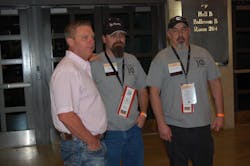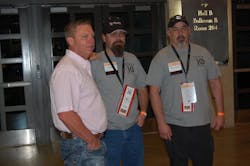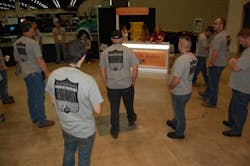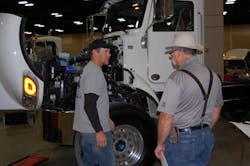So I am here in San Antonio TX attending the 10th annual Rush Truck Centers (RTC) Technician Skills Rodeo (being help immeasurably by my editorial compatriot Aaron Marsh; and does he take good photos or what?!)
This year, some 163 RTC technicians are battling it out for cash awards, prizes, and hourly raises. Interestingly, though, are the 12 Level 1 and 2 tec“The biggest thing is retention now; my whole focus for 2016 is to reduce turnover,” Besson explained to me. “We’re finding that most technician turnover occurs among Level 1-3 techs; the average guy stays less than a year. But if you can keep that Level 1-3 for three years – if you can get them over that hump – then you’ve got them and can really grow them.”
He also noted that the average age among truck technicians is 43 and that “graying” of the workforce is a problem, much like it is among the truck driver population, but for different reasons.
In Besson’s view, it’s not just about bringing “younger people” into the truck technician field; it’s also about how to transition the “seasoned” Level 3-5 techs into leadership roles within RTC’s service organization.
“We’ve set up a mentor program with a twist to help us develop a seasoned leadership corps,” he pointed out. “Not only do the veteran techs serve as mentors to the Level 1-2 guys, those Level 1-2 folks also grade their mentors on leadership and teaching skills – they grade each other.”
Yet such efforts don’t just apply to folks in the shop bays working directly on trucks, engines, transmissions, and the like, for building capability, experience, and retention is also key on the parts support side of the shop ledger, Whitt Michael, VP of the parts operations at Rush Enterprises, told me.“The parts guys work in tandem with the technicians; they need to be just as computer savvy and pay just as much attention to detail to parts as the technicians do to trucks,” he explained. “We need strong parts personnel working that back counter to enable technicians to do their jobs better.”
Michael noted that this is the second year RTC has held a parts-focused competition along with the main technician challenge and more parts personnel took and passed the first-round testing to make it to the San Antonio event this year compared to 2014.
And if you think this is all just a big party where attending technicians get to sit back and relax with friends, you need to talk with some of the veteran competitors like Dustin Ebert out of RTC’s Phoenix shop.
“I’m here to win and win it all; that is my mindset every year,” he told me. “And this is not easy; we’re getting 45 minutes to solve problems that usually take us 4 to 5 hours back in the shop. These are very hard problems and the competition is intense.”
[Here’s video from seven years ago of Ebert defending his 2007 grand champion title.]
“I’m a very visual person so that helps me in figuring out these diagnostic challenges sometimes,” he explained.
“You might have two trucks with the same fault code, the exact same electronic problem, but in one case it’s a push-pin issue while in the other it’s a severed wire," Ebert (wearing the black baseball cap in photo at right) said. "So I’m always looking to see if there is something out of place; that can be the key in many issues.”
The highly-electronic nature of today’s trucks also plays to Ebert’s particular problem solving skill set, and it’s also why much of the “wrench turning” needed in truck maintenance is really being relegated to the Level 1-2 technicians.
“The really difficult part is the diagnostics; only after you get that figured out is when you replace a component, if needed,” he said.
We’ll find out in a few days if Ebert’s skill set will carry him back to the winner’s circle, this time in the medium-duty division.



